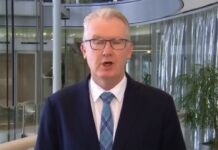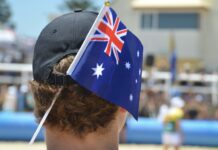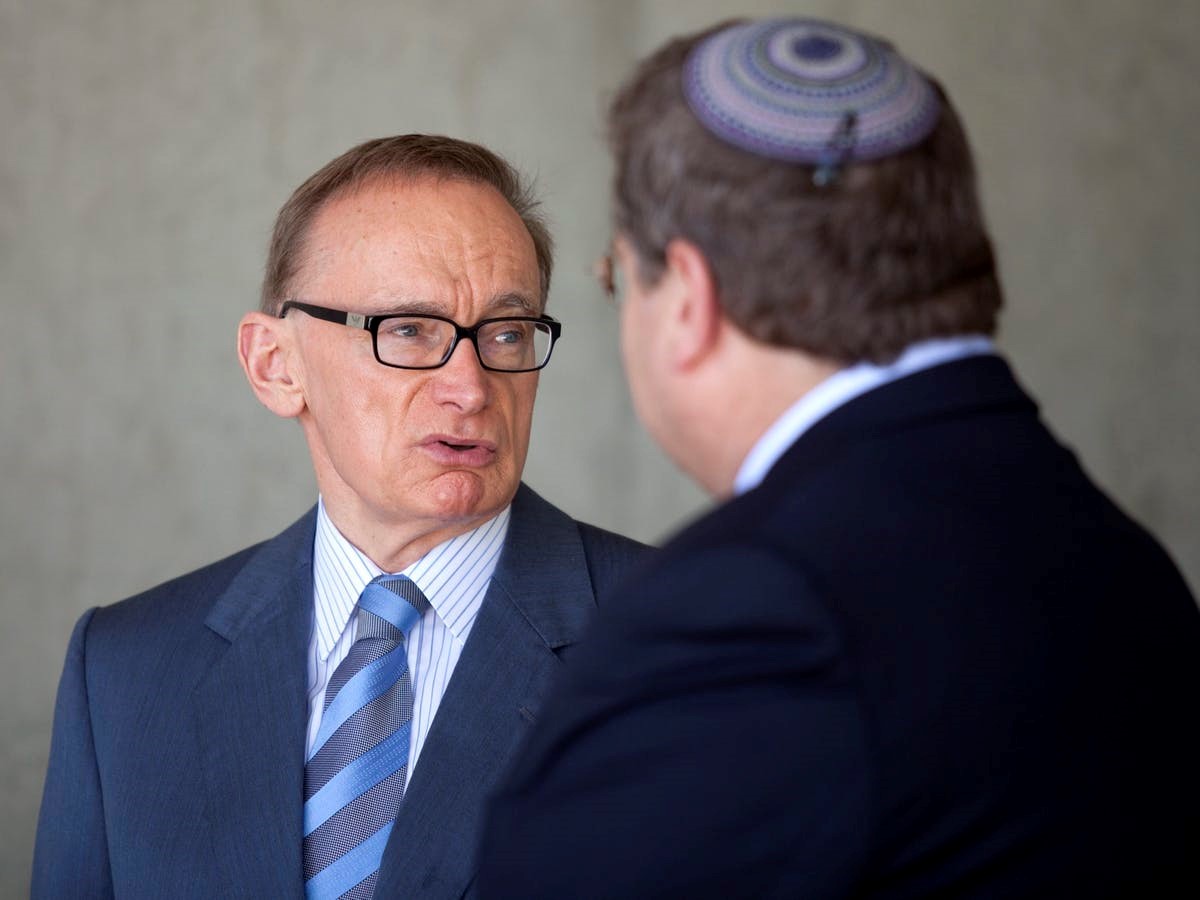
Editor’s Note: This week will feature a series of articles written by Brenton Sanderson, courtesy of The Occidental Observer. They focus on the role of jewish ethnic lobby groups and in particular Mark Leibler in pushing “diversity” and mass immigration on an Australia that never asked for it.
Furthermore, while XYZ News has focused on the role of Marxists, political aborigines and international institutions in foisting “the voice” referendum upon us, it is important to understand the motives of jewish ethnic lobbyists who are fellow architects of the so-called “voice to parliament”.
Go to Part 1.
Go to Part 2.
Go to Part 3.
Go to Part 4.
Bob Carr — Friend then Exasperated Foe of the Israel Lobby
In his memoir, Run for Your Life, published in 2018, former foreign minister Bob Carr outlined his journey of disillusionment with Israel and with its supporters in Australia. Carr’s first clash with Rubinstein and Leibler’s AIJAC was in 2003 when Sydney University’s Peace Foundation awarded its annual Sydney Peace Prize to veteran Palestinian activist and politician Hanan Ashwari, citing her commitment to human rights and the peace process in the Middle East. Rubinstein, outraged at the decision, claimed Ashwari was “an apologist for violence and terrorism,” and called on Carr (then Premier of New South Wales) to refuse to present the prize to Ashwari. Carr refused.
The City of Sydney, one of the sponsors of the prize, which came under fire from AIJAC, suddenly announced it would boycott the ceremony. Professor Stuart Rees, head of the Sydney Peace Foundation, was subjected to “severe pressure” including abusive phone calls over the Ashwari decision. Rees noted that threats were made to “our supporters to the effect that their interests might be affected if they pursue their association with the peace prize.”[1] Based on his experience as editor of The Age, Gawenda has “no doubt Rees and Carr were subjected to abusive phone calls from individuals who see anti-Semitism and hatred of Israel everywhere.”
Looking back on the Ashwari episode, Leibler regards the AIJAC’s militant approach that resulted in alienating the likes of Carr (hitherto a strong supporter of Jews and Israel) as a strategic mistake. He claims that, if AIJAC had its time again, it would not have been so concerned about Ashwari’s Peace Prize. “It was not that important. Sometimes, we have to know when silence is best. I think I have certainly learnt not to react to everything. And I think I have learnt to say things in a more measured way.”[2] When asked whether AIJAC’s actions turned friends (like Carr) into enemies, Leibler claimed “Making us responsible for our enemies is to blame Jews for anti-Semitism. I utterly reject that.”[3]
Recalling the hysterical reaction of organized Jewry to his presenting the Sydney Peace Prize to Ashwari in 2003, Carr writes:
The storm of criticism that then occurred was a shock … and an insight. Soon after my participation was announced, Jewish leaders launched an international campaign to force me to withdraw from the award. There were threats of funding being withdrawn from the University. … Letters of protest were dispatched about the awards going to a Palestinian, switchboards were set aflame with indignation.[4]
This incident underscored for Carr the power of the Israel Lobby in Australia to distort and control Australian foreign policy. Particularly egregious, in Carr’s view, was the influence exerted by the people who ran AIJAC — Leibler and Rubinstein in particular. Of the Lobby, Carr wrote:
The hold of the Israel Lobby over Australian politicians is based on two facts. First, the donations to political parties from the Jewish community leadership; second, paid trips to Israel extended to every Member of Parliament and journalists [i.e, Rambam Fellowships]. From the Australia/Israel and Jewish Affairs Council (AIJAC) over 700 trips alone. … No other community, treats politicians as their poodles.[5]
One of those treated as a poodle, Carr implies, was Prime Minister Gillard, in whose Cabinet he served as Foreign Minister. Eight months after his appointment to this position, in November 2012, his relationship with Gillard became strained over a looming United Nations vote on a resolution to grant non-member status to Palestine. Carr supported voting in favor of the resolution, while Gillard was “adamant that Australia should vote against it.”[6] Carr lobbied colleagues in favor of the resolution and in the end, with a significant bloc of Labor MPs sympathetic to Carr’s stance, Gillard decided Australia would abstain from voting on the resolution.
Carr was convinced that Bruce Wolpe, Gillard’s Court Jew and “liaison with the Jewish community,” was Leibler’s spy in the Prime Minister’s Office. Carr shared this view with Leibler at a meeting at the ABL offices in Melbourne. According Leibler, Carr spent an hour “ranting and raving and yelling to the point that it could be heard all over the office.” Wolpe’s name got several mentions. Afterwards, “the two men hardly spoke to each other again and avoided each other as much as possible, such was the level of distrust between them.”[7]
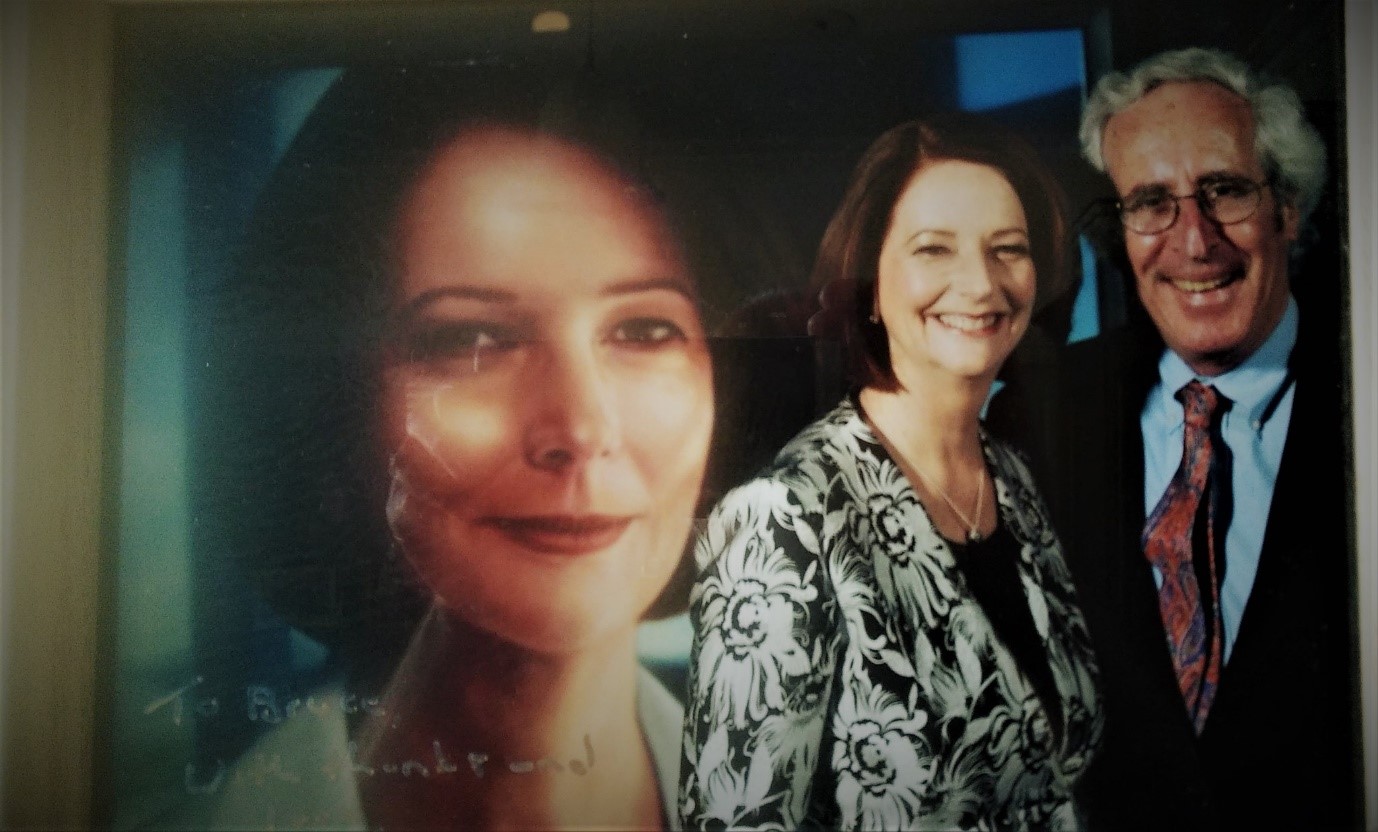
In Diary of a Foreign Minister, published in 2014, Carr describes how the Israel Lobby made his life hell whenever he wanted to issue a statement on any issue involving Israel. He found it exasperating that he couldn’t even issue a “routine expression of concern about the spread of settlements” without aggressive push back from the Lobby. As she had done to Rudd when he was Foreign Minister, Gillard vetted — and sometimes vetoed — his statements on Israel and the Palestinians. Carr notes that some of his proposed statements “merely repeated government policy, for instance that the settlements were obstacles to peace.”[8] Gillard expressed surprise at Carr’s exasperation on these issues when surely Carr “must have known of the issues she had with Rudd about Middle East policy and that she was on good terms with Leibler.”[9]
Indeed, Carr knew at the time of his appointment that Gillard had been captured by organized Jewry. Critical to this capture was when, in 2001, while Shadow Health Minister, Gillard “first went to Israel in a group of Labor and Liberal politicians chosen for AIJAC’s Rambam Israel Fellowship.” The effect of this trip on Gillard was far from unique, with Carr noting how “the program has produced scores of politicians and journalists who are poodles of AIJAC.”[10] Due to such influence, both Rudd and Carr came to believe that the Israel Lobby was a malign force that “distorted Australia’s policies on the conflict between Israel and the Palestinians, and turned many politicians and journalists into the Lobby’s puppets, or, to use Carr’s word, ‘poodles.’”[11]
To gauge the propagandistic effectiveness of Rambam Fellowships, “participants are asked to provide feedback of their experience. Some are invited to a function to talk about what they saw, whom they spoke to, and the impact the visit had on them.”[12] Gillard first met Leibler at one of these debriefing sessions. Over subsequent years, “Leibler’s relationship with Gillard continued to grow. After Australia’s abstention in the vote in the United Nations, the two met. Gillard had come to appreciate Leibler’s keen sense of what was happening in politics and she appreciated his encouragement and concern for her.”[13] When asked whether she thought AIJAC, and Leibler in particular, were powerful, Gillard was unequivocal:
Look, yes in the sense that the Jewish community in Australia — the Melbourne community in particular, because I know it best — is well connected. Put it another way, the community has done a good job over many years of developing deep connections across both side of Australian politics. They therefore have the networks and the access to put a particular point of view.[14]
In 2010, Gillard appointed Leibler to co-chair her Expert Panel on Constitutional Recognition of Indigenous Australians. In 2017 a proposal from the Expert Panel recommended that an Aboriginal advisory body be included in the Australian Constitution. Aboriginal activist Marcia Langton claimed that Leibler told her “that his own history, being Jewish, gave him a great understanding of the genocide of the indigenous people and you know, there’s no question that it did.”[15]
Leibler and the Abbott, Turnbull and Morrison Governments
The power of AIJAC has not waned since Gillard’s tenure as Prime Minister. This reality is clear to Gawenda who notes the fact that “a meeting between Prime Minister Scott Morrison and AIJAC’s three most senior leaders could be arranged not long after Morrison replaced Malcolm Turnbull as leader of the Australian government [in 2018] is evidence of an organization at the height of its influence.”[16] These leaders were Leibler, Rubinstein and Solomon Lew, the billionaire retailer and long-time funder of AIJAC. Rubinstein had proposed the meeting and was surprised how quickly Morrison responded. For Gawenda, Morrison’s swift response was “not really surprising.”
Although Leibler did not know Morrison well, he had met him several times when Morrison was Treasurer, and Leibler was close to Josh Frydenberg, the Liberal Party’s Deputy Leader and newly elected federal Treasurer, whom he had known for 20 years or more, since Frydenberg had worked as an advisor to John Howard. By the time Leibler and the delegation met with Morrison, Frydenberg had become the most senior Jewish politician in Australian history. There is little doubt that Frydenberg had briefed Morrison about a possible meeting with the AIJAC people. What’s more, Morrison would have been aware of Leibler’s connections in Canberra, probably remembering that his predecessor as Prime Minister [Malcolm Turnbull] had chosen Leibler to MC at the official lunch for Benjamin Netanyahu in Sydney in February 2017.[17]
The AIJAC leaders took a list of demands to the meeting with Morrison. Their top priority was for Australia to officially abandon its previous support for the Iran nuclear deal (a purely symbolic gesture given Australia was not a party to that agreement). The second priority was for Australia to move its embassy from Tel Aviv to Jerusalem. Three days after the meeting, Morrison announced that the government was examining the possibility of moving the Australian embassy from Tel Aviv to Jerusalem. At the media conference Morrison refused to say whether he had been briefed by Foreign Affairs or by his own department on the consequences of the embassy move. Clearly, the Morrison acted purely at the urging of the AIJAC triumvirate and his deputy leader Frydenberg “who made it clear that he favored its move from Tel Aviv to Jerusalem.” Frydenberg said he “would not comment on any meeting he might have had with the Prime Minister” in relation to this issue.[18] Before the 2019 federal election, Morrison announced his government was committed to moving the Australian embassy to West Jerusalem when the time was right.
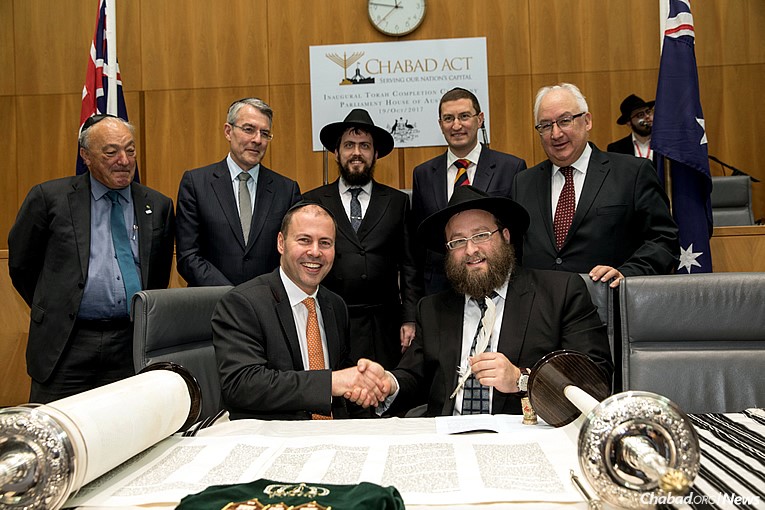
Gawenda observes there “is little doubt that Leibler and AIJAC push on open doors when it comes to having access to the Prime Minister and senior ministers in his government.” This has been the case for many years now: at an AIJAC function held at the offices of ABL in 2013, then Prime Minister Tony Abbott was asked what his position was on some aspect of the conflict between Israel and the Palestinians. “Oh, my position is whatever Mark and Colin’s position is,” he answered.[19]
Chair of the United Jewish Appeal
By the early 1990s, Isi and Mark Leibler had become senior leaders not only of Australian Jewry, but also in the organizations of world Jewry. Isi had served numerous terms as President of the Executive Council of Australian Jewry and was co-chairman of the World Jewish Congress. Mark had been president of Zionist Federation of Australia for a decade, and was a Jewish leader with “unmatched political contacts in Canberra and a record of getting things done.” By the late 1990s, in addition to his chairmanship of AIJAC, he was president of the United Jewish Appeal.
The United Jewish Appeal determines how money raised in diaspora communities will be spent on projects in Israel and, increasingly, in diaspora Jewish communities, especially the six-million-strong community in the United States. For more than 25 years, Leibler has flown to Israel for meetings of Keren Hayesod, the Israel-based institution that governs United Israel Appeal (UIA) organizations that operate worldwide except in the United States, and of the Jewish Agency for Israel. The Jewish Agency, with an annual budget of around $US400 million (mainly raised by American Jewish organizations) is the most financially powerful Jewish organization in the world.
Increasingly, it funds “projects in the diaspora that are designed to bolster Jewish identity and connection to Israel in communities where assimilation looms large and where there is evidence of weakening ties to Israel. It funds the Birthright programs that send young Jews on organized tours to Israel and around 1,800 shlichim, the young Israeli emissaries sent to diaspora communities to work in schools, universities and Zionist youth groups in order to promote the migration of young Jews to Israel. The Jewish Agency also funds diaspora Zionist organizations such as ZFA.[20]
In Leibler’s six years as President of the United Jewish Appeal from 1995 to 2001, its Australian affiliates raised around $200 million. In some years they sent more money to Karen Hayesod than equivalents in Canada (which has a Jewish population three times larger than Australia) and more than any Jewish community in Europe (including France). These fundraising results gave Leibler significant influence and power in international Zionist organizations.
Under Australian law, donations to charities that run programs in developing nations were tax-deductible. Despite the fact Israel is a wealthy country, Leibler “with his expertise in tax law, managed to win an exemption for the UIA.” UIA’s tax-deductible status was threaten in 1998 when Israel was officially classified as a First World country. In response:
Leibler went to see [then] Foreign Minister Alexander Downer and told him that despite Israel’s First-World status, the funds raised by the UIA were going to refugee resettlement in Israel and to Jews living in difficult circumstances in Eastern Europe, Ethiopia and the Balkans. Downer was convinced and shepherded through amendments to the Income Tax Assessment Act that allowed UIA to retain its tax deductibility and, therefore, its position as the world’s biggest fundraiser for Israel outside the United States. This achievement helped ensure Leibler’s standing as one of the world’s outstanding Zionist leaders.[21]
Leibler’s networking and connections with senior Australian and Israeli politicians, together with the very large donations of wealthy Australian Jews to the UIA, gave him great clout in world Jewry. It has long been clear to Leibler that “there would never be a mass Aliyah from the prosperous and increasingly assimilated Jewish communities of the West,” and that “donating to Israel was a way to express support and even love for the country.”[22]
Leibler’s successor as chairman of the Jewish Agency, Natan Sharanksy, who held the position from 2009 to 2018, changed Leibler’s strategic focus, shifting away from projects in Israel to “projects that strengthened Jewish identity, particularly in the United States,” which become a “first-order priority” for the Agency.[23] Sharansky’s successor, former Israeli politician, Isaac Herzog, reaffirmed this focus on the “American Jewish community, so large and powerful, but so vulnerable, at least in terms of Jewish continuity.”[24] Regarding Australian Jewry, by contrast, Herzog noted there was “no other community like it in the world. So united, so strongly Zionist.”[25]
Contemporary Demographics of Australian Jewry
Australian Jews are overwhelming middle to upper class, with surveys finding 78 per cent of Australian Jews were “comfortable or better.” Around one-in-five Australian Jews had an annual personal income of $104,000 or more, compared to 7 per cent of the general population. Australian Jews mostly live in the middle-class or upper-middle-class suburbs of Melbourne and Sydney. The socioeconomic profile of Australian Jews is reflected in voting patterns. Around half vote for the Liberal Party, as opposed to the Labor and other minor parties. The Liberal Party gives them the neo-liberal economic policies (including tax cuts) that benefit them financially, while also being more enthusiastically pro-Zionist than the Labor Party. The Liberal Party is also fully on board with the mass immigration and multiculturalism that comprise the central pillars of the Jewish ethno-political strategy for the West. Disputes within Australian Jewry over the last several decades (many involving Isi Leibler) have not been about this agenda, according to Gawenda, “but about tactics and personal status, about who speaks for the community and, above all, about who has access to prime ministers and senior government ministers.”[26]
While equally wealthy, American Jewry, a community three or four generations older than Australian Jewry, is more assimilated with higher rates of intermarriage — a trend which, according to Gawenda, threatens the world’s largest Jewish community. The intermarriage rate in Australia is less than half that of the United States, with rates among Orthodox Jews close to zero.
This trend has been bolstered over the last few decades by the arrival, since the end of apartheid, of over 15,000 South African Jews in Australia. These Jews “are the world’s most educated émigrés, 70.8 per cent at tertiary level, the most well-heeled, the most cosmopolitan in the way they travel, the only migrant group capable of spending time and money coming on visits before selecting their relocation spots.”[27] They are also among the most ethnocentric Jews in the world, with Tatz noting how their mentality is encapsulated in “daily pontification about the Jewish-goyishe divide” and in his grandfather’s refrain that “The worst of ours are better than the best of theirs.”[28] Even other Australian Jews have been taken aback by the insularity of these newcomers, how “socially, spatially, culturally, religiously, they huddle in enclaves of their own creation.” “Marrying out” for these intensely parochial Jews means marrying a non-South African Jewish spouse.
Tatz ascribes this hyper-ethnocentric mentality to the fact “the shtetl remains engraved in their immigrant souls.” From the time of the mass Jewish exodus from Lithuania to South Africa in the early twentieth century, these Jews were, he notes, “saturated” with the notion of separateness. He also attributes their extreme ingroup preference to “the specter of anti-Semitism, the dark shadow of rejection by an anti-Semitic and intolerant world.” It is only among themselves, he maintains, that they can “relax at least for a while — laugh, cry, be brash, busy, creative, funny and not worry about what the goyim think.”[29] The reputation of South African Jews in Australia took a significant hit in 2009 when the Sydney Morning Herald reported that Barry Tannenbaum, a South African Jewish immigrant, had scammed investors out of $1.5 billion in a Ponzi scheme that was likened to Bernie Madoff’s crime in the United States.[30]
Given this infusion of South African Jews, and the high fertility rates of existing groups of Orthodox Jews, Markus predicts the proportion of Australian Jews “who are ultra-Orthodox or Modern Orthodox will increase, and the community might become even more conservative.”[31] Unlike in America, Reform Jews, even today, represent only a small minority of Australia’s Jewish population.
Preventing his own children and grandchildren from marrying non-Jews was a first order priority for Mark Leibler, and Gawenda notes “how important it was for him that his children, and now his grandchildren, married Jews. He can be pretty sure that his family, his children and grandchildren will be committed Jews, committed to their Judaism and to the sort of religious Zionism in which three generations of the Leibler family have played such as prominent role.”[32] Each of his children “have followed in their parents’ footsteps: each married a Jew; none has weakened his commitment to Zionism and to the continuity of the Jewish people; none has ever doubted that they would.”[33] Leibler’s son Yehuda has Australian, American and Israeli citizenship — but sees himself unequivocally as an Israeli. “When he thought about Australia,” notes Gawenda, “he thought about his family and the Jewish community. The fact that he was a citizen of Australia, or of America, did not mean much to him.”[34]
The Leibler Dynasty Continues
In 2018, Mark Leibler’s son Jeremy, a partner at ABL, was elected president of the Zionist Federation of Australia. Meanwhile Colin Rubinstein’s son, Paul, ABL’s managing partner in Sydney, is the New South Wales chairman of AIJAC and is touted as a likely successor to Mark Leibler as AIJAC’s national chairman. Gawenda claims the next generation of Jewish leaders will face daunting challenges which include “the rise of anti-Semitism around the world, including in Australia.”[35]
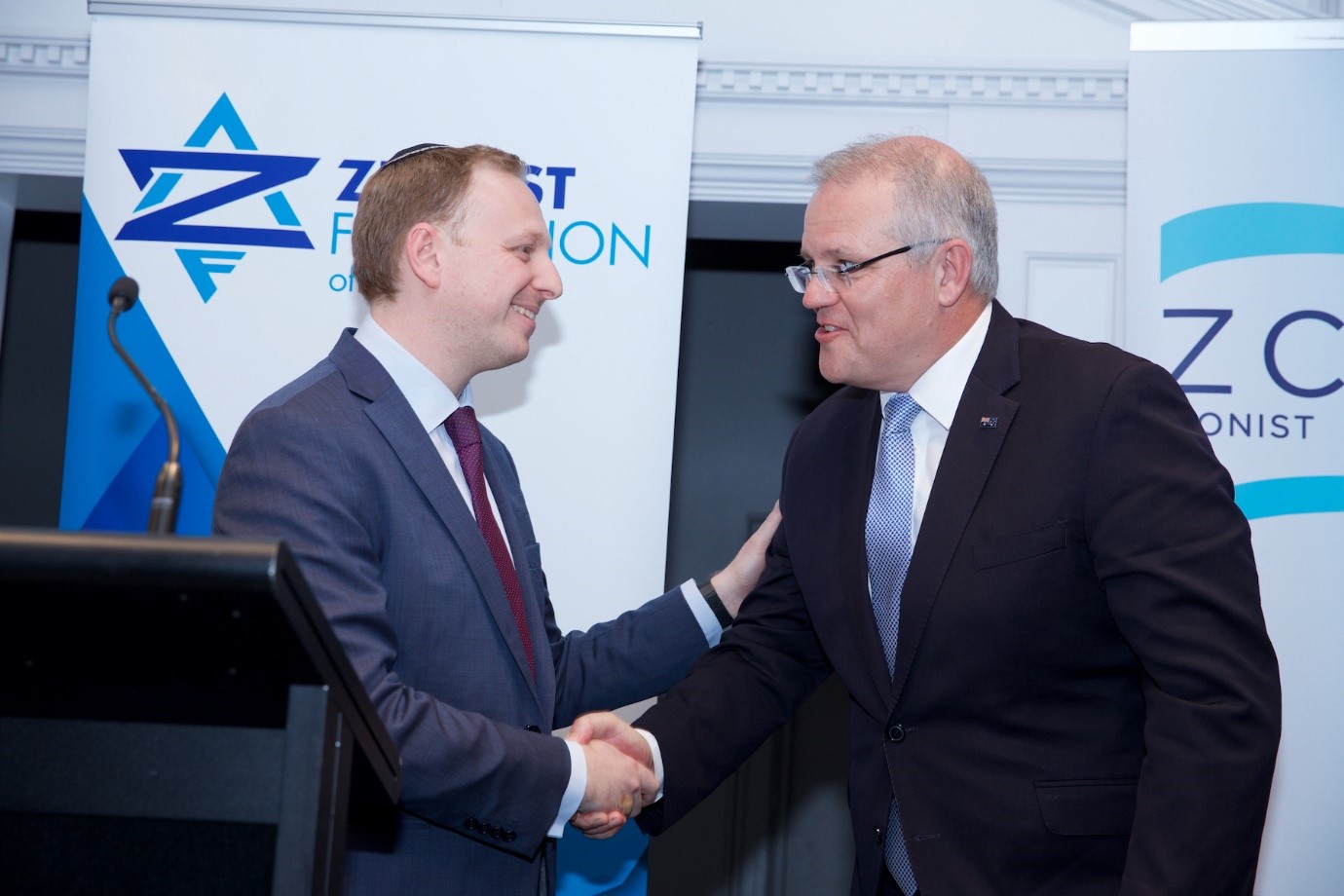
Mark Leibler is more sanguine than his brother Isi about the future of Jews in the diaspora. Nevertheless, he thinks Jews are far less safe in some diaspora communities, including the United States, than he thought possible a decade or two ago:
Anti-Semitism has been on the increase for three decades and has accelerated in the past few years. Who could imagine even a few years ago that a major party in Britain would be led by an anti-Semite or, at least, by someone who has made numerous anti-Semitic remarks and has tolerated the growing number of anti-Semites in his party? I still can’t believe it, that Jeremy Corbyn was the leader of the British Labor Party and could well have been Prime Minister. … But as far as grassroots anti-Semitism is concerned, it’s probably worse in France than in England. In America, there has undoubtedly been an alarming increase in violent extreme anti-Semitism from the left and right. What is happening there was unimaginable a few years ago.[36]
As a rabid Zionist, Leibler is particularly concerned about growing anti-Zionism on university campuses in the United States. He insists this “so-called anti-Zionism invariably traffics in anti-Semitic canards about the money power of Jews for instance.” The irony of his making these remarks as the leader of Australia’s wealthiest, most politically well-connected and powerful ethnic group seems to have escaped Leibler. Leibler believes Islamist anti-Semitism, encouraged and supported by the far left, poses a bigger threat to Australian Jews than right-wing anti-Semites.
Mark Leibler’s brother Isi had also expressed concern at the growing threat of Islamist anti-Semitism. In an article for the Jerusalem Post entitled “European Meltdown Threatens Jews,” he lamented the negative impact of large-scale Muslim immigration to Europe on Jewish communities there. He notes that: “With the indigenous population shrinking and the Muslim birthrate alarmingly high, unless the flow of migrants is stemmed, there is every possibility that by the end of the century the foundations of European civilization will be destroyed.” Through “dramatically destabilizing the social cohesion and security of countries harboring them,” Muslim migrants have led to Diaspora Jewish communities “suffering severe trauma as they experience the erosion of the acceptance and security they have enjoyed over the past half-century.” What makes this all the more concerning for the elder Leibler is the fact this influx of Muslims is, to a great extent, the direct result of Jewish ethnic activism.
Yet ironically, many liberal Jews are at the forefront of campaigns to open the door to widespread immigration of Muslim “refugees” and even make ridiculous bleeding-heart analogies to the plight of Jews during the Holocaust. In so doing, they are facilitating the entry of hordes of embittered anti-Semites who have been brought up to consider Jews as the “offspring of apes and pigs.”
For Leibler, flooding Europe with these “hordes” is regrettable, not primarily because, if the trend continues, “by the end of the century the foundations of European civilization will be destroyed,” but because the end result will be that Jews in Europe are increasingly forced to “live in societies where horrific terrorist attacks against their schools, synagogues, museums and supermarkets have necessitated military or armed guards to provide security.”
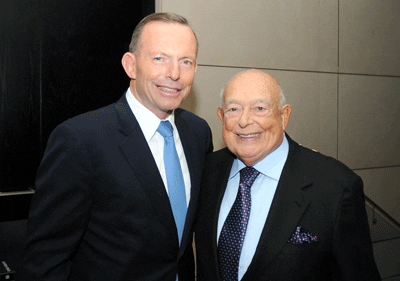
The mass importation of Muslims into Europe also presents a danger to Jews, according to Isi Leibler, in fueling the rise of the far-right. He notes that activist Jews, in advocating and facilitating the influx of Muslims into Europe, inevitably “enrage many of their neighbors who loathe these ‘refugees’ and fear that this flood of immigration will destroy their way of life.” The result has been “the meteoric rise of radical right-wing movements in all European countries — Jobbik in Hungary and the Golden Dawn in Greece [which] are outright anti-Semitic and neo-Nazi movements.” Despite nationalist leaders like Marine Le Pen having “vigorously condemned and disassociated her party from its former anti-Semitism,” Leibler insists the rank and file members of parties like the National Front that notionally “support Israel” remain “unreconstructed traditional anti-Semites.”
Leibler is part of the distinct (though growing) minority of activist Jews who regard the Jewish strategy of transforming Europe through mass Muslim immigration as “bad for the Jews.” In 2010 he voiced his strong support for non-White immigration and multiculturalism for Australia while rejecting these policies for Israel. He thus accepts it to be in the interests of Jews to dilute and weaken the identity of the majority European-derived nations in which many live. For Leibler, however, this non-White diversification strategy for is only good for Jews providing “hordes of embittered anti-Semites” from Muslim nations aren’t the primary means of achieving it.
A silver lining of the rapidly-accelerating destruction of Europe for Isi Leibler is that, unlike vulnerable Europeans, Jews can always flee to an ethnically-homogeneous “Jewish state” that provides “a haven for all Jews.” As an ultra-Zionist he naturally hopes that, as European societies become increasingly violence-plagued, dysfunctional and inhospitable to Jews, “many will leave and join us in Israel and participate in the historic renaissance of our people.”[37] As a result of Jewish activism, millions of White people are also increasingly fearful of their or their children’s future. Unlike Jews, however, they don’t have the option of fleeing to the relative safety of an ethnostate.
Originally published at The Occidental Observer on December 8, 2020.
Brenton Sanderson is the author of Battle Lines: Essays on Western Culture, Jewish Influence and Anti-Semitism, available hereand here.
[1] Michael Gawenda, The Powerbroker: Mark Leibler, An Australian Jewish Life (Melbourne: Monash University Publishing, 2020), 259.
[2] Ibid., 260.
[3] Ibid., 260.
[4] Bob Carr, Run For Your Life (Melbourne: MUP, 2018), 177.
[5] Ibid., 178.
[6] Gawenda, The Powerbroker, 279.
[7] Ibid., 280.
[8] Bob Carr, Diary of a Foreign Minister (Sydney: NewSouth, 2014), 388.
[9] Gawenda, The Powerbroker, 283-84.
[10] Ibid., 285.
[11] Ibid., 3.
[12] Ibid., 285.
[13] Ibid., 286.
[14] Ibid., 286.
[15] Ibid., 208.
[16] Ibid., 335.
[17] Ibid., 336-37.
[18] Ibid., 338.
[19] Ibid., 341.
[20] Ibid., 310-11.
[21] Ibid., 313.
[22] Ibid., 316; 315.
[23] Ibid., 317.
[24] Ibid., 320.
[25] Ibid., 319.
[26] Ibid., 75-76.
[27] Colin Tatz, Human Rights and Human Wrongs: A Life Confronting Racism (Clayton, Victoria; Monash University Publishing, 2015), 350.
[28] Ibid., 16.
[29] Ibid.
[30] Nick O’Malley & Thomas Graham, “Exposed: the Sydney man accused of $1.5 billion scam, The Sydney Morning Herald, June 13, 2009. https://www.smh.com.au/national/exposed-the-sydney-man-accused-of-15-billion-scam-20090612-c640.html
[31] Gawenda, The Powerbroker, 329.
[32] Ibid., 334.
[33] Ibid., 360.
[34] Ibid., 352.
[35] Ibid., 335.
[36] Ibid., 356-57.
[37] Isi Leibler, “European meltdown threatens Jews,” The Jerusalem Post, December 20, 2026. https://www.jpost.com/Opinion/European-meltdown-threatens-Jews-476004


